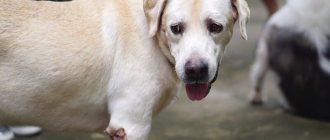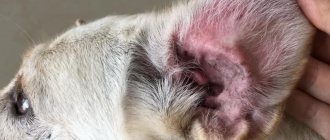Pollakiuria is the term for frequent urination in dogs. This phenomenon may be a harbinger of a developing disease, may signal that the pet is experiencing stress, and sometimes this is the norm. When you should worry and contact a veterinarian, and when you can help your pet at home, this article will help you figure it out.
The frequency of urination depends on the health of the genitourinary organs. The condition of the lower urinary tract affects the storage capacity of the bladder and the nerve pathways that stimulate the act of urination itself.
Thus, frequent urination may indicate a disease of the lower urinary canal, damage to the bladder or urethra.
How often should a dog urinate?
Each dog has its own normal frequency of urination. This largely depends on the regime in which you and your pet live.
If you walk your pet two to three times a day, and he does not have free access to the street, then he will only urinate during these walks (with proper upbringing).
It is worth considering that all dogs behave differently during walks. Some perform their need at one time, while others urinate a little several times during a walk, thus marking their territory.
Here it is important to distinguish the natural process of “marking” from painful frequent urination (a responsible owner will be able to see this from the behavior of the pet).
If your dog has free access to the street (it’s good if it’s a private yard, because self-walking on the street is deadly) or at home there is an adapted toilet (tray or diaper), then the frequency of urination can be about 7-8 times a day. It depends on the size of the dog, the amount of water consumed and some other factors.
It's different for puppies. Up to three months they urinate approximately 12 times a day and during this time they do not control this process.
Causes and symptoms
The causes of frequent urination can be divided into natural and pathological.
Natural causes
High water consumption
This occurs during the summer months when it is hot. Or if the dog was active a lot during the day. The more water you consume, the more often you urinate, this is natural. However, if water consumption is many times higher than normal, then this is an alarming symptom called polydipsia.
Overexcitation of the nervous system
Typically, small breed dogs can pee from emotional overstimulation. The individual characteristics of the pet or gaps in upbringing may play a role here. It happens when you don’t spend enough time with your dog. In those rare moments when you pay attention to your pet, she can forget herself in joy.
Stress
If the dog is under stress. Pollakiuria is a common symptom, even if everything is fine with your health. Stress can be provoked by a change of place of residence, the appearance of new pets, punishment, even quarrels between family members, affecting the pet.
Sexual characteristics
It has already been said above that cables can urinate frequently and little by little during a walk. This is how they mark their territory. Neutered females usually do not do this. Bitches usually cope in one or two times during a walk. But when a dog is in heat, frequent urination accompanies this entire period.
If the causes of frequent urination are natural, then usually there are no other symptoms other than pollakiuria and the urine is normal: without impurities, transparent, light yellow. The exception is during estrus. Also, stress can manifest itself as several symptoms, or just one.
Pathological causes and their symptoms
Nephritis, glomerulonephritis and some other kidney damage
Nephritis is an inflammation of the kidneys caused by an infectious agent. A dangerous disease in which all tissues of the kidney are affected, and subsequently the inflammation spreads to the tissues of other organs. If no measures are taken, death is possible. Symptoms:
- frequent urination in small volumes;
- Blood is found in the urine. In some cases, this can only be done by conducting laboratory tests, and in advanced cases, the color of urine even changes due to blood;
- proteinuria (increased protein in the urine, detected during laboratory testing);
- pain when urinating. The dog arches unnaturally and may whine;
- difficulty urinating;
- elevated temperature;
- violent, profuse vomiting;
- the hind legs may be weaned for a short period of time.
Various forms of cystitis
Cystitis is an inflammation of the mucous membrane of the bladder. Often, together with cystitis, there is inflammation of the urethra - urethritis. Symptoms:
- urination is frequent and painful;
- increased body temperature;
- appetite decreases;
- the dog is losing weight;
- vomiting is possible.
Sand in the bladder, kidneys or urethra
If such a pathology is detected, then it is necessary to take therapeutic measures as soon as possible, since stones can form over time. In some cases, this sand can be sharp, which causes extreme pain to the pet. Symptoms:
- urination is frequent, but in very small volumes, sometimes just a few drops come out;
- blood is often found in the urine;
- the main symptom is difficulty urinating due to pain. The dog sits in one place for a long time, strains, and sometimes whines in the process.
Detrusor hyperspasticity (overactive bladder)
The detrusor is a muscle that contracts the bladder when it is full. When this muscle is overactive, the bladder empties even when it is not even half full.
This phenomenon may be associated with the individual characteristics of the dog’s body, but more often this occurs after an injury, when there are disorders of the spinal column, as there is a disruption in the innervation of the bladder. Another name for this pathology is neurogenic bladder.
Symptoms:
- sometimes, such a deviation does not bother the dog in any way, except for frequent urges to go to the toilet;
- in other cases (after injuries), the dog experiences involuntary urination, leakage, etc.
This pathology has different ways of development and manifestations. Many complications are possible, most often urinary tract infections.
If a dog drinks a lot (polydipsia) and urinates frequently (pollakiuria), then the combination of these two symptoms may indicate a number of diseases:
Diabetes
It is an endocrine disease caused by a variety of causes that interfere with insulin production.
Pyometra
This is purulent inflammation of the uterus. Occurs only in unspayed female dogs, usually over five years of age.
The general conclusion regarding the pathological causes of frequent urination (we have listed the main ones) is that in pathologies of the genitourinary organs, pollakiuria is not the only symptom of the disease. Based on the general condition of the pet and accompanying signs, it is easy to suspect a particular disease.
Reasons why a dog urinates frequently
To understand why a dog urinates frequently and how to overcome this problem, you need to analyze the reasons
, as a result of which such a snag may occur.
Pollakiuria
(frequent urination is called that way in medicine) can be either for
physiological reasons
or
a symptom of a disease
.
And if in the first case there is no need to panic, but just wait a while or take measures to correct the pet’s behavior, then in the second case
the help of a qualified veterinarian
may be required .
Let us remember that dogs are direct descendants of wolves and therefore, at the level of instinct, they relieve their needs very far from their lair
. This protects the puppies from infectious diseases and protects the den from enemies. But suddenly the dog experiences a violation of this instinct. What are the possible reasons? The reasons may be psychological or a disease.
- Such diseases, the symptom of which is polyuria (frequent urination) and pollakiuria (frequent urination with a large volume of urine), include:
- Cystitis.
- Sugar and non-sugar diabetes.
- Renal failure during chronic process.
- Ectopia.
- Bitches are in heat.
- Spinal injuries.
- Excessive intake of sodium salts.
- Oncological diseases of the bladder.
Any of these diseases requires immediate attention from a veterinarian. After all, frequent urination leads to aggravation of existing health problems for your pet.
Description of some diseases with pollakiuria (the dog urinates frequently)
1 Unspayed bitches
experience increased urination
before the onset of estrus In this case, urination occurs frequently and in small portions. However, even after sterilization, the same phenomenon can be observed in animals that are prescribed medication with progesterone for treatment. This is directly related to the disruption of the body’s hormonal balance and homeostasis in general. 2 The above-mentioned non-sugar diabetes in dogs contributes to disruption of water and electrolyte metabolism. In turn, this disorder provokes polydipsia (increased thirst) in which urine density drops sharply. In diabetes insipidus,
there is a sharp lack of antidiuretic hormone.
3 In diabetes mellitus
, as a result of a sharp disruption of metabolic processes in the dog’s body, the body’s need for fluid increases.
Why is this happening? The reason lies in the altered osmotic pressure of the blood. Due to the increase in blood glucose concentration, blood density and osmotic pressure increase. We will not describe the harmful consequences of this process. Let’s just say that the result is not long in coming - the dog drinks a lot and for a long time, and after that it begins to pee without waiting for a walk. 4 If an old male dog suffers from polyuria, then the reason for this may lie in the weakening of the urethral sphincters
and/or
hormonal imbalances
.
With age, the level of testosterone in the blood drops significantly, which may be the main reason that the dog began to pee frequently. If the male dog is sterilized, then a sharp drop in testosterone after sterilization is associated with the removal of testicles. And the consequence of this may be increased urination and, accordingly, frequent urination. By the way, with certain desirable positive aspects that are noted after sterilization of male dogs, numerous negative and even harmful effects on the dog’s body are also noted. 5 With chronic renal failure,
a dog experiences increased thirst and frequent urination. In this case, urine often contains blood and contains large amounts of uric acid. These indicators can be determined during laboratory testing.
Psychological reasons why a dog urinates frequently
Let's consider psychological reasons
pollakiuria in dogs. If your four-legged pet drinks little, and his diet is optimal, and his tests are all normal, then most likely the reason for frequent urination lies in the psychological plane.
When a dog plays a lot and its nervous system is overstimulated, uncontrollable urination often occurs. This happens especially often with puppies.
During heat, the dog often leaves marks on its territory to attract males. Or, on the contrary, the male marks all the corners and hills. And this also applies to sexual behavior, and not to diseases. Also, the dog begins to urinate frequently after mating.
It is important to understand that in all of these cases, the issue of correcting the pet’s behavior is acute. A veterinarian or animal psychologist needs to explain in what cases a dog urinates very often. A detailed description of the problem often helps to make the right decision even without veterinary diagnostic methods.
First aid
The first thing you should do is contact a veterinary clinic for a full diagnosis of your pet.
Attention! You should not give any medications from your home medicine cabinet to your pet. Even if it helped the neighbor's dog. You can only do harm.
All you need to do is provide your pet with enough water (especially if urination is frequent and little by little) and walk it more often.
If there is bad weather outside, if possible, provide the dog with a toilet in the house - lay out a diaper or show a tray (if the dog’s size allows it). The dog's place should be warm so that a draft does not blow in.
If urination is frequent, but without difficulty, in moderate quantities and the urine is normal (light yellow, transparent and without impurities), then it is worth considering that the dog may be under stress.
But even if nothing else bothers your pet, it’s better to play it safe and have his urine tested in a laboratory; perhaps they will find impurities that are invisible to the eye.
Diagnostics
A complete diagnosis is only possible in a clinical setting. First of all, it is important for the veterinarian to know what the pet is fed, whether it is vaccinated, what has bothered it recently, and in general what diseases/surgical interventions the animal has suffered during its life. These questions must be answered by you, the owners.
Then the veterinarian examines the dog and prescribes the necessary laboratory tests, standardly these are blood and urine tests.
If necessary, additional research methods will be prescribed, for example, ultrasound or x-rays.
What to do if the puppy starts peeing frequently?!
In order not to speculate unfoundedly why the puppy often pees,
at the slightest suspicion of a deviation from the norm, it is better to see a specialist - do an ultrasound, take general blood and urine tests to diagnose the puppy and begin timely treatment.
Do not forget, if your pet is very worried in an unfamiliar environment or does not tolerate transportation in a car, if its condition is of concern, you can always call a veterinarian at home.
If necessary, a whole team of doctors with all the equipment necessary for diagnosis and treatment goes to the furry patient’s home. Based on the results of the examination, the doctor will prescribe a course of treatment or prevention of the disease. If absolutely necessary, the dog is hospitalized at the clinic.
The problem of frequent urination in dogs is familiar to many breeders. If a dog urinates frequently, its owner should understand the reasons to rid his pet of this problem. Detailed information regarding this issue is provided below.
Treatment
Treatment is prescribed exclusively by a veterinarian after a full diagnosis and diagnosis has been made.
Also, the pet is prescribed a special diet, in which it is very important to maintain the required level of protein and closely monitor water consumption.
Of the ready-made feeds for urinary tract diseases, Royal Canin urinary is usually prescribed.
It is very important to follow all the veterinarian’s recommendations in order to stabilize your pet’s condition and prevent relapses.
Popular questions
Why does a dog urinate frequently after mating?
There may be several reasons for this phenomenon. The most dangerous of them is infection during mating. You can’t do this without the help of a veterinarian. Also, a consequence of mating may be non-infectious inflammation, which provokes frequent urination. This can also be caused by simple hypothermia, so it’s not always the male’s fault.
Also, this may have a natural cause - hormonal fluctuations as a result of estrus and subsequent mating.
Why does a dog urinate frequently during heat?
During estrus, pollakiuria is considered normal; it is associated with a hormonal surge. The dog urinates frequently and in small portions. In the urine you can find viscous mucus with a small admixture of blood. Owners of bitches usually know what is normal for their pet during heat.
Why does my puppy pee often?
Until approximately three months, puppies do not control the process of urination and, normally, pee up to 12-13 times a day. Requiring patience from them to go to the toilet three times is almost impossible.
If you notice that your puppy has difficulty urinating and sits down several times in an hour, then you should contact a specialist.
Natural causes
Incontinence in pets can indicate a variety of problems. Contrary to what many breeders believe, incontinence is not limited to older pets. It must be taken into account that any dog is an emotional animal, which in the process of life is guided by instincts. For males, the smell of urine is a sign of dignity, which is why many males “mark” the territory in which they live.
As practice shows, a dog often urinates for the following reasons:
- stress;
- fear of something;
- fear of other, more aggressive pets;
- pain.
In fact, in these cases, the animal does not require treatment; the breeder will only need to make adjustments.
Frequent urination can also be caused by urolithiasis; in this case, blood may also be present in the urine.
Behavioral features
Why does the dog pee a lot? Incontinence in pets can be due to behavioral characteristics. You should not shout at the dog or hit him, as this will have no effect. It doesn’t even make sense to treat a pet; the dog breeder will only have to educate the animal and be as patient as possible (video author - Kremproc P).
If males mark territory in this way, they tend to urinate in any place. As for bitches, they usually go to the toilet in the corners. Treatment in this case will consist only of sterilization or castration. As a result of a decrease in sexual instincts, the need to urinate will disappear.
Age characteristics
If you don’t know why your dog has incontinence and what to do about it, then keep in mind that this may be due to the age of the body. In particular, we are talking about weakening of smooth muscles. The only thing you can do in this case is to give your pet certain medications prescribed by the doctor.
Another reason why your pet may become incontinent is when they are in heat. As a rule, this problem often manifests itself during the first estrus in young individuals. As the dog begins to experience nagging pain, he may try to go to the toilet to get rid of it. This can actually be done by reducing pressure.
As for treatment, in this case it is not necessary. The only requirement from the breeder is to walk the dog more often, but you cannot scold your pet. The dog already understands that urinary incontinence and, as a consequence, the need to clean up the dog’s puddles is an unpleasant matter for the owner. However, it’s hard for a dog to correct itself, so get into its position.
It often happens that your pet drinks a lot of water and, accordingly, is not able to wait until you go outside with him. In principle, this is normal, but if the dog still drinks a lot of water, then this may indicate illness.
Presence of deviations
Why else is a dog diagnosed with incontinence? If it is associated with deviations, then treatment for this cause may not produce results at all. As a rule, in this case the cause lies in congenital or acquired abnormalities of the dog. They are caused by contraction of the urethral muscles, and accordingly, incontinence will occur regularly. Treatment of abnormalities will never completely rid your pet of incontinence (video author: Maxim Golovanov).
What to do and what to do in such cases? It is necessary to take your pet to see a doctor. If you can get rid of the pathology at an early stage, you may be able to cure it.
Briefly about the main thing
- Frequent urination is called pollakiuria.
- The causes of pollakiuria can be natural or pathological.
- Natural ones include: high water consumption in the hot season, emotional overexcitability, stress, estrus in females, marking territory in males during a walk.
- Pathological include: various diseases of the urinary tract (nephritis, cystitis, urolith, sand in the bladder or kidneys, etc.). And also, disruption of neurogenic conduction as a result of injuries to the spinal canal.
- Diagnosis is carried out in a veterinary clinic, since, at a minimum, it is necessary to conduct laboratory tests of blood and urine.
- Treatment is prescribed by a practicing veterinarian; you should not resort to traditional methods, much less use drugs from a human first aid kit without prescription.
Natural causes
If your dog urinates frequently and a lot, this may indicate health problems. And, unfortunately, such phenomena do not always accompany old age. A person must remember that dogs are emotional creatures and are often guided by their instincts. Males generally mark territories this way, because it’s not for nothing that they have superiority.
The dog urinates very often due to:
- fear;
- nervous tension;
- excitement;
- pain in the bladder.
This is not the entire list of reasons, but its main points. If your dog urinates frequently due to one of the first three points, then no treatment is required. You just need to explain to the animal why this should not be done. And in some situations you need to wait a while.











